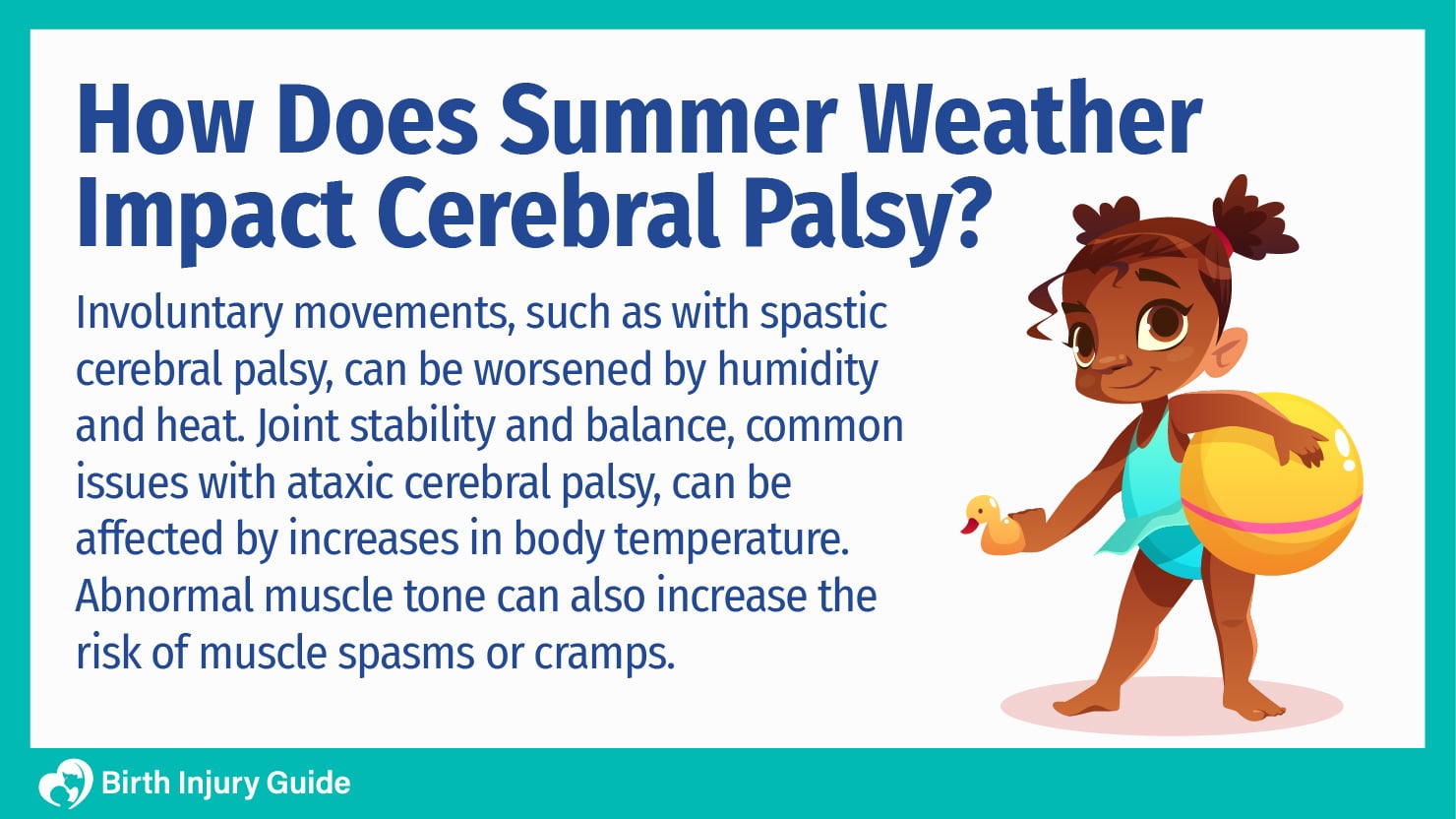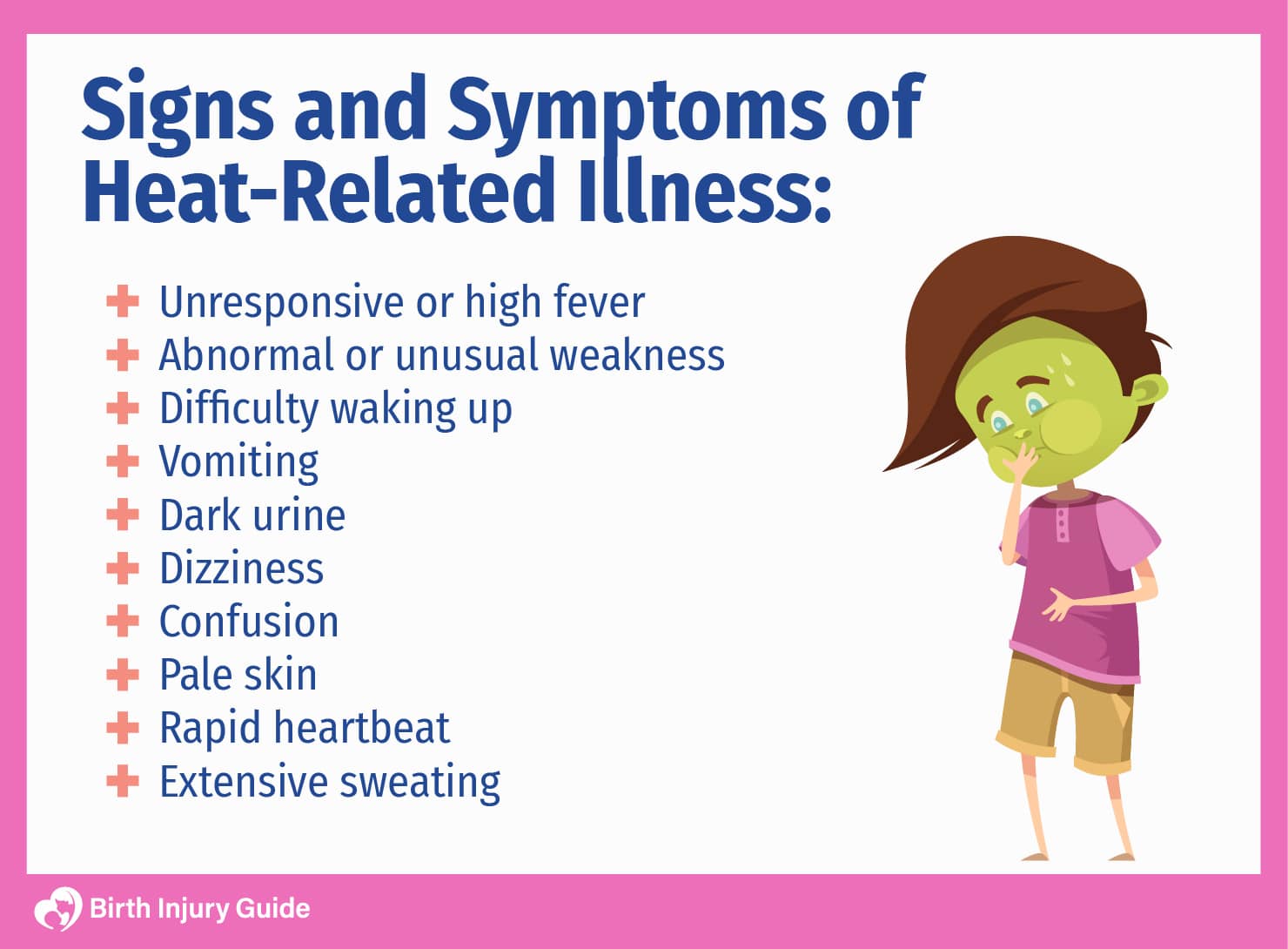
How Does Summer Weather Impact Cerebral Palsy?
Summer is almost upon us, and that has many people gearing up for school to be out, traveling and more outdoor adventures. If you know someone who has cerebral palsy, you may also be wondering if summer weather impacts cerebral palsy symptoms. The answer is “yes!” Changes in weather temperature and humidity can have a significant effect on individuals with cerebral palsy, and summer has some impacts that are more significant than other seasons.
Read on to learn more about how summer weather can impact cerebral palsy. To find out more about living with cerebral palsy, contact Birth Injury Guide to speak with one of our birth injury attorneys.
How Does Summer Weather Impact Cerebral Palsy?

Weather can have a significant impact on how our bodies feel. Our joints and muscles often respond to changes in weather conditions, humidity, barometric pressure and other factors. For individuals with cerebral palsy, these weather-related changes can be debilitating. Involuntary movements, such as with spastic cerebral palsy, can be worsened by humidity and heat. Joint stability and balance, common issues with ataxic cerebral palsy, can be affected by increases in body temperature. Abnormal muscle tone can also increase the risk of muscle spasms or cramps.
The brain and spinal cord, which are affected by cerebral palsy, are linked to every other part of the body. It is important to realize how injuries or illness affect your entire body.
So, how do you prepare for summertime and work around possible impacts? Consider the following helpful tips from Jessica Grono, an author and educator who happens to have cerebral palsy:
Air Conditioning
Most homes are equipped with air conditioning, but many are not. If the air conditioning is not turned on yet, keep a fan on nearby when sitting, standing, or using the bathroom. Grono says that she struggles with sitting and standing movements if she is too warm as her body spasms.
Careful Dressing
Think carefully about your clothing. Wearing loose-fitting clothing can help moderate your body temperature and offer more comfort. Dark colors absorb heat, so avoid wearing dark clothing, especially if you plan to be outdoors. Choose clothing that is made from lightweight materials like linen or cotton. Avoid polyester or wool.
It is also advisable to wear a hat and use sunscreen, especially for children. Use a broad-spectrum sunscreen that provides adequate protection for how long you will be outside.
Ice Cold Water
Drink lots of ice water, especially if you are active or are outside. Drinking ice water can help lower your body’s temperature. Keep cold water on hand, and if you require the assistance of a wheelchair, invest in a water bottle with a long, flexible straw for easy access. Avoid drinks with a lot of caffeine or sugar, as they can promote dehydration.
Cold Foods
Eat chilled or frozen foods. If you are overheated, sometimes simply eating a cold snack like fruit or a salad can help you feel cooler. This is also a great way to enjoy healthy snacks, especially on-the-go. Great cold snack options include fruits and vegetables like melon, berries, cucumbers, or smoothies. A healthy diet is important for individuals with cerebral palsy.
Use a Spray Bottle
If you are moving around a lot, traveling, or are planning to be outdoors, carry a spray bottle of cold water with you. If you feel overheated, you or someone with you can spray just enough cold water on you to cool you down. Aim for spots like the back of your neck, forehead, and arms. The cool mist can be refreshing and fun.
Take a Swim
Swimming is a great resource for someone with cerebral palsy. Not only is it a great way to cool down, but it also is a safe and effective way of getting exercise. Swimming does not put as much strain on your joints and muscles as other forms of exercise. It is a healthy way to build strength and muscle tone without the effects of more vigorous exercise. If you have athetoid cerebral palsy and uncontrollable movements, swimming is a great way to relax and just enjoy movement.
Check your local gyms, YMCA, or other organizations to see if there are specialized swimming classes in your area. Many gyms and hospitals offer classes specifically for people with special needs like cerebral palsy.
Signs and Symptoms of Heat-Related Illness to Be Aware Of
Anyone is vulnerable to extreme temperatures and weather conditions, but individuals with conditions like cerebral palsy may be more susceptible due to limitations in movement, motor control, and sometimes speech. Individuals with cerebral palsy may not be able to adequately monitor and manage their body temperature without assistance. It is important that anyone with cerebral palsy, or anyone caring for someone with cerebral palsy, understands the risks of heat exposure.

Be mindful of the following signs and symptoms:
- Unresponsive or high fever
- Abnormal or unusual weakness
- Difficulty waking up
- Vomiting
- Dark urine
- Dizziness
- Confusion
- Pale skin
- Rapid heartbeat
- Extensive sweating
Any of these symptoms could indicate heat exposure, which if left untreated, could have a detrimental impact on your health. If not properly treated, heat exposure can lead to heatstroke.
Heat stroke may cause the following symptoms:
- Difficulty breathing
- Lack of sweating
- Red (flushed) skin
- Seizures
- Fainting
- Fever of 104 degrees or higher
If heat exposure symptom progress to this level, it is important to get medical attention right away. Heat stroke is a serious medical condition, and you should never underestimate how quickly it can escalate.
Treating Heat Exposure or Heatstroke
Treatment of heat exposure should begin as soon as discomfort is noted. In mild cases, treatment may only consist of cooling the body down by moving into the shade or air conditioning, drinking sips of cold water, or taking a cool bath. Many people also find that wrapping a cool towel around their neck helps to lower their body temperature. If you are overheated, you should never drink alcohol or drinks containing caffeine.
In more severe cases, heat exposure or heatstroke may require medical attention for proper treatment. If you have taken steps to cool down body temperature but the fever does not abate, the individual begins to have seizures, or breathing becomes impaired, you should contact 911 immediately. You may also find it necessary to administer CPR. Parents or caregivers of individuals with cerebral palsy should be First Aid and CPR certified, and should be aware of any needed modifications based on the condition.
Learn More about Living with Cerebral Palsy
If you or someone you love has cerebral palsy, you want to know as much as possible about enjoying warm weather safely. It is important to understand the risks and how to avoid possible illness or injury. To find out more about living with cerebral palsy, visit our website.
Sometimes people develop cerebral palsy because of a birth injury. Brain damage or oxygen deprivation during birth can lead to this and other neurological disorders. If you believe your child’s cerebral palsy is the result of a birth injury or medical negligence, contact Birth Injury Guide. To speak with a birth injury attorney, call us at 1-877-415-6603 or fill out our online form.

